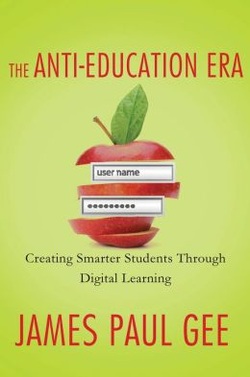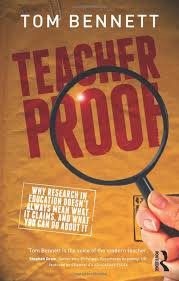Thus his new book, The Anti-education Era: Creating Smarter Students through Digital Learning, is bound to attract interest.
Unfortunately, the book ultimately disappoints. Chief among the problems is that—despite the subtitle--there is very little solid advice here about how to change education.
In fact, the first 150 pages scarcely mentions education at all. It is a laundry list—16 chapters in all—of the weaknesses of human cognition. This is territory that has been well covered in other popular books by Chabris & Simon, Ariely, Schacter, Kahneman, and others.
I can’t really fault Gee for not doing as creditable a job in describing human cognition as these authors. It is, after all, their bread & butter, not Gee’s. But the presentation is slow-paced and there are some errors. For example, Gee gets the definition of grit wrong (p. 202) He flatly states that we think well only when we care about what we are doing (p. 12) but the relationship between motivation and performance depends on the complexity of the task and the expertise of the performer.

It’s only the last 60 pages of the book that address ways that digital technologies might come to our aid in addressing the frailties of human cognition. Here Gee is on his home turf, but it’s too well-trod: getting people to work together, ensuring that people feel safe,
The problem is not that people need to be persuaded that these are good ideas. The problem is that we have evidence in hand that they don’t always work. That means that we need a more nuanced understanding about the conditions under which these ideas work. Gee half recognizes this need, and on occasion warns that solutions will not be simple. But he never takes the next step and outlines the complexities for us.
For example Gee retells (via Jonah Lehrer) the story of a building at MIT that housed professors from a wide variety of disciplines, with a concomitant flowering of intellectual cross-fertilization. Gee quotes (with approval, I guess) Lehrer: “The lesson of Building 20 is that when the composition of the group is right—enough people with different perspectives running into one another in unpredictable ways—the group dynamic will take care of itself.”
As an academic who has been doing interdisciplinary work for 20 years, I would counter: “Like hell it does.”
Virtually every school of education is housed in a building with people trained in different disciplines, and interdisciplinary work remain rare. For reasons I won’t get into here (and much to the despair of university administrators) interdisciplinary work is hard.
So despite the title, educators will find little of interest here.
Common sense strikes back
Gee had better hope he does not meet up with Tom Bennett in a dark alley. Bennett is a British teacher who has been in the classroom since 2003, and has written for the Times Educational Supplement since 2009. (If you’re a reader outside the UK, you may not know that this is a very widely read weekly.)
Bennett’s fourth book, just out, is titled Teacher Proof: Why Research in Education Doesn’t Always Mean What it Claims, and What You Can Do about It.
The book is comprised of three sections: in the first, Bennett provides an overview of education research. In the second he evaluates some education theories, and in the third he suggests a better way forward.
As I read Teacher Proof , I kept thinking “This is one pissed off teacher.” The language is not at all bitter—in fact, it’s frequently quite funny, and Bennett is a marvelous writer—but you can tell that he feel cheated.
Cheated of his time, sitting in professional development sessions that advise an experienced teacher to change his practice based an evidence-free theory.
Cheated of the respect he is due, as researchers with no classroom experience presume to tell him his job, and blame him (or his students) if their magic beans don’t grow a beanstalk.
Cheated of the opportunity to devote all of his attention to his students, given that researchers are not simply failing to help him his do his job, but are actively getting in his way, to the extent that their cockamamie ideas infect districts and schools.

The first third of the book contrasts science and social science. The upshot, as Bennett describes it, is that social sciences aspire to the precision of the “hard” sciences but can’t get there. They are nevertheless full of pretentions, “walking around in mother’s heels and pearls,” as Bennett says, pretending to be a more mature version of itself.
There’s not much nuance in this view. As Bennett describes it, education research is not just badly done science, it is pretty much impossible-to-do-well science, given the nature of the subject matter.
This section of the book struck me as odd, both because it didn’t match my impression of the author’s view, based on his other writings, and in fact conflicts with the second section of the book.
This section offers a merciless, overdue, and often funny skewering of speculative ideas in education: multiple intelligences, Brain Gym, group work, emotional intelligence, 21st century skills, technology in education, learning styles, learning through games. Bennett has a unerring eye for the two key problems in these fads: in some cases, the proposed “solutions” are pure theory, sprouting from bad (or absent) science (eg., learning styles, Brain Gym); others are perfectly sensible ideas transmogrified into terrible practice when people become too dogmatic about their application (group learning, technology).
Bennett ends each chapter with a calm, pragmatic take, e.g., “yes, I use technology a lot. Here’s where I find it useful.” As he says early on, Experience trumps theory every time.”
But here’s where I think the second section of the book conflicts with the first. Bennett’s consistent criticism of these ideas is that there is no evidence to back them up. To me, this indicates that Bennett doesn’t think that social science research is impossible—he’s just fed up with social science research that’s done badly. In the third section of the book Bennett tells us what different actors in the education world ought to do. It is the briefest section by far--less than ten pages—and the brevity matches the tone of the advice: “Look, a lot of this really isn’t that complicated, gang.”
Namely:
- Researchers need to take a good long look in the mirror.
- Media outlets need to be less gullible.
- And teachers should appear to comply with the district’s latest lunacy, but once the door closes stick to the basics, and Bennett lays out his version of the basics in 8 spare points.
To the “what people should do” list, I’d add another directive: schools of education should raise their standards for what constitutes education research. Bennett is right—too much of it is second-rate.
There is an ugly system of self-interest that has produced the terrible research (and in turn, the need for Bennett’s book). Professors want to publish in peer-reviewed journals because that brings prestige. So publishers create “peer-reviewed” journals that have very low standards because journals bring them money. Institutional libraries buy these terrible journals (keeping them in business) because faculty say that they are needed so that faculty and students can keep up with the latest research. And universities are reluctant to blow the whistle on the whole charade because schools of education—second-rate or not--bring tuition dollars.
Teacher Proof is a worthy read. There have been scattered criticisms of the theories that Bennett takes on, but seldom collected in one place in such readable prose, and seldom (if ever) with a teacher's eye for the details of practice.
Teacher Proof is also a timely read. In the UK, impatience with the influence that shoddy science has had on teaching practice is mounting. Teachers are sick of being told what to do, with phantom “research” used as the excuse. Would that the same will happen in the US! Teacher Proof may help.
 RSS Feed
RSS Feed